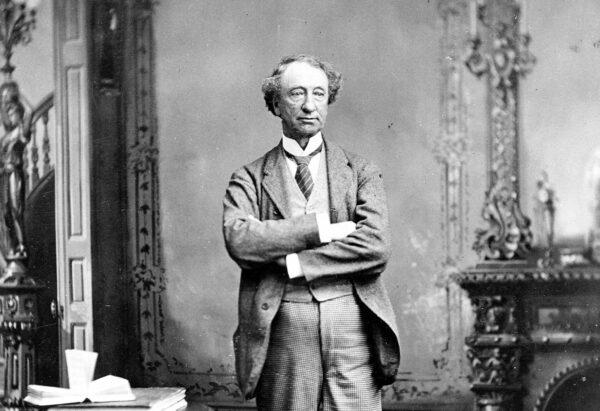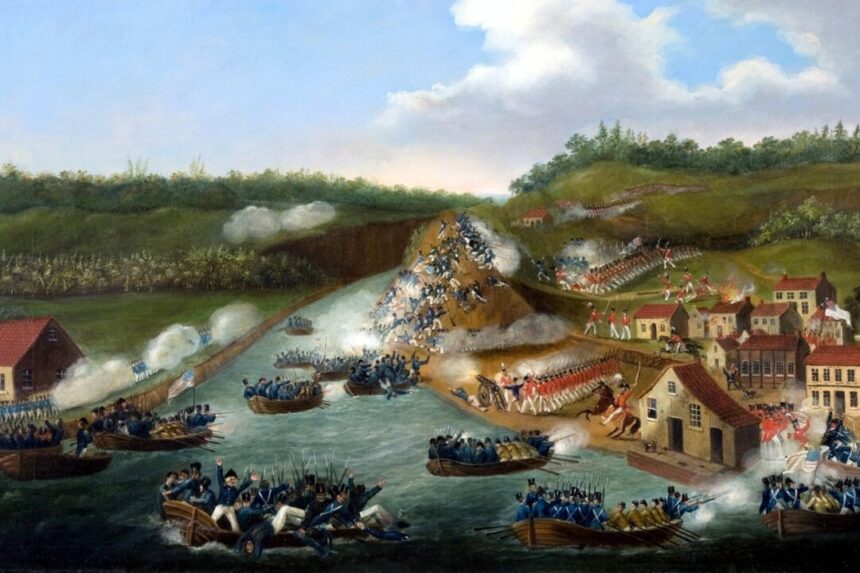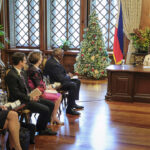Commentary
War and memories of war have always been important to Canadians—even the Fathers of Confederation.
In my last two years of high school, I worked Saturdays and summers in West Vancouver’s best second-hand bookshop, the Bookstall in Ambleside, where my boss was a World War II veteran named David Angus Moon. He’d served in the Royal Canadian Naval Volunteer Reserve, the RCN(R), and the Royal Navy, and in June 1944, in command or second-in-command of a landing craft in the Battle of Normandy.
He once showed me a photograph of his younger self, whiskers dark instead of white under a well-worn forage cap, with some mates among the ruins of Bernières-sur-Mer at Juno Beach a few weeks after D-Day. It would have been about 1987, more than 40 years after the event, that he showed me the picture, but like yesterday to Dave Moon, who died in 2006. “It’s a war” he would say of the losing battle to keep order among the books.
Today, the last veterans of that war who are still around are getting pretty venerable, like 101-year-old Bryce Chase, who lives in Calgary’s Colonel Belcher retirement home, or Victor Osborne of Nanaimo, who is 106.
Despite the passage of time, we honour them still. People want to remember the great deeds of our forebears and those who died. On Remembrance Day, 35,000 turned out in Ottawa, according to the Royal Canadian Legion, and there were big crowds everywhere—testament that Canadians want to honour their veterans, including the 40,000 who completed tours in Afghanistan between 2001 and 2014.
When Canada, already 200 years old, was re-founded as a federal Dominion in 1867, some of the Fathers of Confederation were veterans of the War of 1812 or had a close connection to veterans. The war had ended 50 years before the Charlottetown Conference and was part of fairly recent memory and family lore. A fair number of the Fathers were only one generation removed from the war.

Sir John A. Macdonald. CP Photo/National Archives of Canada
Sir John A. Macdonald’s uncle, Lt.-Col. Donald MacPherson, saw action in U.S. Commodore Isaac Chauncey’s attack on Kingston Harbour during the War of 1812. One of MacPherson’s six daughters (thus Macdonald’s cousins) could remember shots penetrating “the wooden walls of the pretty white cottage that then did duty as the commandant’s residence.” (To imagine Upper Canada in those days, think rustic Jane Austen but with bullets).
Young Johnny Macdonald, devouring “his uncle’s library and the ‘slices of pudding’ set aside by Macpherson’s youngest daughter,” grew up in the shadow of the War of 1812. He was 14 when his uncle died in 1829, buried in Kingston with full military honours, “the minute guns from the city battery being answered by those from the fort,” fired by the 71st Highlanders. Later, everywhere Macdonald campaigned in 1860, biographer Donald Creighton relates, he met “lawyers, merchants, farmers, young men … and old men who had fought in a dozen political battles and bore the medals of the War of 1812 upon their chests.”
Sir George-Étienne Cartier, who brought Quebec and British Columbia into Confederation, was proud of his Militia connections. Both his father and grandfather served. Cartier and Macdonald’s right-hand man, Hector-Louis Langevin, later a cabinet minister, was married to Sophie-Scholastique LaForce, whose father, Major Pierre LaForce, was one of Salaberry’s Voltigeurs officers in the 1813 battle of Chateauguay, in which Canadian-born militia and native allies forced back the American invasion aimed at capturing Montreal.

Hon. George Etienne Cartier. Public Domain
One of Macdonald’s mentors in Upper Canada, Sir Allan Napier MacNab, born in Niagara in 1798, had volunteered at the age of 14 and served in the Militia at Sackets Harbor, Plattsburgh, Black Rock, and Fort Niagara. Sir Charles Tupper, who brought Nova Scotia into Confederation, got his start in politics in the 1850s under the influence of an 1812 veteran, James W. Johnson, the Conservative leader and pre-Confederation premier whose portrait hangs in the legislative chamber in Province House today.
Sir Oliver Mowat, a Confederation delegate in 1864, went on to become Ontario’s third premier and eighth lieutenant governor. His Scots father, John Mowat, was a Peninsular War veteran among the 6,000 troops sent by the Duke of Wellington to Canada to fight in the War of 1812, and served at Plattsburgh in 1814.
Nor was it untypical for Macdonald’s caucus members, and not least the Quebecers, to have a connection to the war. Theodore Robitaille, MP for Bonaventure after Confederation, was a longtime Tory backbencher except for a stint as Receiver General, until Macdonald made him the fourth Lieutenant Governor of Quebec in 1879, and afterwards a senator.
Even in this story, there is a connection to the War of 1812, as Robitaille’s great uncle served as chaplain of the Lower Canadian Militia during that time.
Sir Richard Cartwright, a Liberal MP and descendant of a Loyalist officer from the Revolutionary War, advocated for the preservation of Upper Canada’s traditions during the War of 1812. In 1887, he inquired about the remaining living veterans of the war, revealing that there were 271 veterans still alive, with many receiving pensions.
Sir Étienne-Paschal Taché, a Canadian founder, had a close connection to the War of 1812. He was a Victorian French Canadian who served in the military, represented his constituency, and emphasized the importance of loyalty to Canada’s traditions and values.
Taché’s famous speech in 1846 highlighted his experiences during the war and his belief that a French Canadian would fire the “last cannon shot” in defense of Britain. He later played a significant role in Confederation, connecting the War of 1812 to this pivotal moment in Canadian history.
Despite changes over time and challenges to Canada’s historical identity, the sacrifices of war veterans remain a strong part of Canadian memory. It is important for younger generations to gain a better understanding of Canada’s history and traditions, including the significance of events like the War of 1812.
The historian Arthur R.M. Lower once stated that the War of 1812 was foundational to Canada’s identity, shaping the nation’s sense of nationality. As Canadians continue to honor and remember their veterans, there is hope that future generations will appreciate and preserve Canada’s rich history and traditions. Please rewrite this sentence.
Source link







